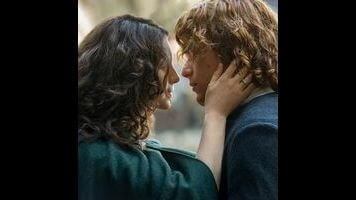“Let me tell it at my own pace,” Claire Fraser says, sitting opposite her ex-husband Frank Randall in the year 1948. Claire’s back in the world she left back in Outlander’s pilot. She’s hurt, confused, mourning. Jamie is gone. Their plans to change the future have apparently gone awry. Frank, who lived for two years haunted by her disappearance, wants answers, but he wants her to give them when she’s ready. She sits him down next to a fire and proceeds to tell him, all night, the whole story. She does so at her own pace. As the second season kicks off with quite the bang, it’s very clear that Outlander still belongs to Claire. It’s her story, and she commands it powerfully. She sets the pace, the tone, the stakes.
For the second time now, Claire has had to explain to a man who loves her that she has traveled through time. Just as Jamie did, Frank accepts it, although his acceptance looks a lot more different than Jamie’s. Subtle differences between the two men trickle throughout “Through A Glass, Darkly.” They’re both kind; they both deeply love Claire, which is where their willingness to believe her comes from. But Frank is a man of reason and of books. He’s considerably more serious and reserved than Jamie. Even as he accepts what Claire tells him, it’s only really because he wants to move forward. All that matters to him is that she’s back. He isn’t going to question the details. In Outlander’s first season, Tobias Menzies pulled off two incredibly different performances as the kind but frustrated Frank and the horrifying villain Black Jack. We didn’t really get to see all that much of the former though, but “Through A Glass, Darkly” swims into the depths of Frank’s inner turmoil, and Menzies is as moving here as he is terrifying when portraying Black Jack. Some of his best moments are the most subtle. When Frank asks Claire to move on from Jamie, she agrees, only to reveal that she isn’t doing it for him at all but for Jamie, who asked her to let him go. The tiny shift in Menzies’ facial expression says it all: She might be back and she might be promising to move forward, but a part of Jamie’s ghost will always linger.
All the complexity of Claire’s return is handled so well, and Caitriona Balfe is magnetic from the instant we first see her waking up at the base of Craigh na Dun. “I wished I were dead,” she says in voiceover. That bleak and brutal confession defines the first half of the premiere, which is dour and disturbing—not at all the happy homecoming Frank wished for. At first, Claire can’t even look him in the eye, reminded all too well of the frightening face of Black Jack. When Frank makes a sudden movement, she actually flashes back to Black Jack in a quick but potent moment. Claire has always been more complex than simple labels like hero or victim. She’s a fighter and a survivor and a healer and a lover and so many other things. She’s as strong as ever when she returns to 1948, but she’s unraveling, too. Everything here is too loud, too mechanical. She can only be herself in the presence of Mrs. Graham, the old woman who first read her palm in the pilot, and she finds herself drifting back to thoughts about Jamie’s sense of humor, his smile, his hair. Outlander almost always excels with the finest details, from the specific and complicated emotions its characters grapple with to the show’s impeccable costuming.
And on that note, Outlander’s production value is as exquisite as ever. Yes, the transition from 1948 back to France in 1745 is so stylized that it should verge on corny, and yet, the moment, sweeping shift from Frank to Jamie, is wholly earned, grounded in the rich romance of the story. Outlander positions viewers so deeply in how Claire feels and thinks that the sudden reappearance of Jamie’s face exhilarates. Outlander has built a world that’s both visually and emotionally immersive.
The emotional and visual contrast between the two timelines is particularly powerful. Balfe plays Claire with a lot more bounce and brightness in the past. Jamie and Claire’s arrival in France is loaded with excitement and hope. The psychological side effects of Black Jack’s brutality are still undeniably there, but the 1745 parts of “Through A Glass, Darkly” are more lively, warmer, more energized. Jamie and Claire’s playful banter persists even as they face the seemingly impossible task of stopping the Jacobite rising and preventing the massacre at the Battle Of Culloden. The fact that we already know that they ultimately won’t be successful only adds to the suspense. We know they will fail, but we don’t know why or how. There’s a lot of fun in Claire and Jamie’s adventures in France as they seek to save the world, but there’s also a foreboding force looming over it all.
Stray observations
- Welcome back, Outlander! I missed you so much. And on that note, I miss Geillis. I will probably mention this weekly.
- I also would like to gently remind everyone that I have not read the Outlander books, so my perspective in these reviews is that of someone who only watches the show. You are welcome to discuss plot details from the books in the comments, but please clearly indicate that they are spoilers.
- “There’s always another fucking war.”
- I get that it was symbolic of their new start, but was burning those gorgeous 18th-century clothes really necessary?!
- “…like a plaid woven out of guile and deception.” Murtagh is damn poetic with this shade.
- Jamie, with some real talk: “Life with you is certainly never dull, sassenach.”


 Keep scrolling for more great stories from A.V. Club.
Keep scrolling for more great stories from A.V. Club.